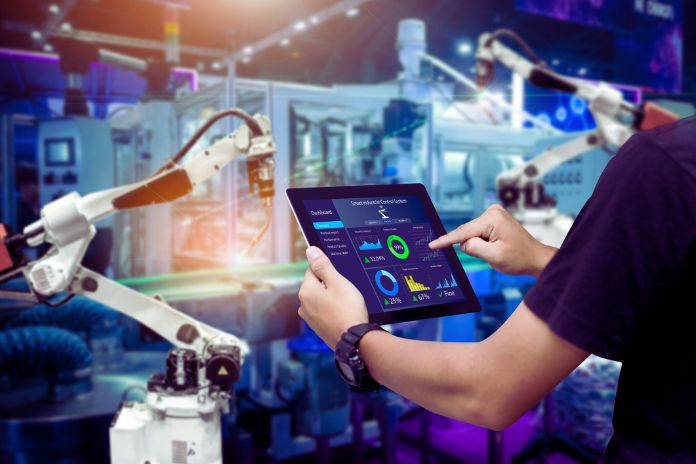Robotics in Industry: The technological revolution brought about by the advancement of robotics is transforming several industries and driving a new era of production.
Industrial robotics appears in this scenario as a key player in contributing to a significant increase in factory efficiency and automation.
After all, this technology allows you to automate repetitive tasks, increase precision and effectiveness, as well as reduce production time. Thus, robotics emerges as a constant and imperative presence in the industrial landscape, decisively altering the nature of work and fundamentally restructuring industrial processes.
However, the implementation of robotics in industry presents both challenges and opportunities for companies. Uncovering the importance of robotics, understanding its benefits, and its implementation challenges is essential to promote a harmonious transition into this new era.
We therefore invite you to continue reading this article, where we will explore each of these aspects in depth, offering an overview of the role of robotics in the industry. Furthermore, we will discuss how robotics can shape and evolve to meet the emerging needs of the industry.
What Is The Importance Of Robotics In Industry?
Robotics plays a fundamental role in today’s industry, bringing significant benefits to both companies and workers.
With technological advancement and the increasing automation of processes, the use of robots in industry has become an increasingly common reality. In this context, robotics assumes strategic relevance, offering several advantages.
Benefits Of Robotic Applications In Industry?
Robotics has played an increasingly important role in the industry, bringing numerous benefits and transforming production processes. Robotic applications, which involve the use of industrial robots to automate tasks and operations, have become increasingly common in companies.
Therefore, these applications bring a series of advantages that positively impact the efficiency, productivity, and quality of products in the industry. In this topic, we will explore some of the benefits of robotic applications in industry.
Automation Of Repetitive And Dangerous Tasks
One of the main benefits of robotic applications in industry is the automation of repetitive and dangerous tasks. Industrial robots are specially designed to perform these tasks accurately and safely, which significantly reduces the occurrence of errors and accidents at work.
Furthermore, automating these tasks frees workers to dedicate themselves to more strategic and creative activities, increasing their satisfaction and well-being at work.
Increased Productivity And Efficiency
Another essential benefit of robotic applications in industry is increased productivity and efficiency. Industrial robots are capable of performing tasks with high speed and precision, which reduces production time and increases the quantity of products manufactured.
This way, robots can operate 24 hours a day, 7 days a week, without the need for breaks and rest, which optimizes the use of production resources and improves the overall efficiency of the process.
Improving Product Quality
Robotic applications in industry also contribute to improving product quality. Industrial robots are capable of performing tasks extremely precisely and consistently, which reduces variability and the occurrence of defects in products.
Robots can be equipped with sensors and cameras that detect and correct any failures during the manufacturing process, ensuring a high and consistent quality standard.
Reduction Of Production Costs
Another significant benefit of robotic applications in industry is reduced production costs. Although the initial investment in implementing industrial robots is significant, the long-term benefits outweigh this cost.
Automating tasks and improving efficiency can reduce the number of employees needed and associated costs, such as salaries, benefits, and training. Robots have a long lifespan and require less maintenance than human employees, resulting in financial resource savings.
Increased Safety In The Work Environment
Robotic applications in industry also contribute to increasing safety in the workplace. Industrial robots are designed to perform dangerous and high-risk tasks, which reduces workers’ exposure to dangerous situations. Additionally, robots can be programmed to operate in confined spaces or hostile environments, which prevents human exposure to adverse conditions. In this way, industrial robots promote a safer and healthier working environment for employees.
Boosting Technological Innovation
Finally, industrial robotic applications play a fundamental role in driving technological innovation. Developing and implementing new robotic technologies drive the industry to seek increasingly advanced and efficient solutions.
Using industrial robots creates opportunities for developing new products, processes, and business models, boosting companies’ competitiveness and sustainable growth.
Challenges In Implementing Robotics
Robotics has played a fundamental role in the industry, bringing challenges in implementing robotics. Implementing robotic systems in production and automation has proven to be an efficient strategy for increasing productivity, precision, and efficiency in daily tasks.
However, introducing robotics also presents challenges that need to be overcome to ensure the success of this technology. Are they:
- Technological complexity: Robotics involves using advanced technologies, such as artificial intelligence and machine learning, which can be complex to understand and configure. Adequate training of professionals involved in implementation is essential to ensure the correct functioning of robotic systems;
- Initial investment: Implementing robotics requires a significant investment in purchasing equipment and training personnel. These upfront costs can be high for smaller companies, making adopting the technology complex. Financing strategies and tax incentives can help mitigate this challenge;
- Integration with existing infrastructure: Often, companies already have an established infrastructure, and it is necessary to integrate robotic systems into the existing production process. Compatibility between robotic equipment and management systems is essential to ensure successful implementation;
- Cultural resistance and fear of job replacement: Introducing robotics may generate resistance from employees, who may fear being replaced by machines. It is essential to promote an organizational culture that encourages collaboration between humans and robots, demonstrating the benefits of technology in carrying out monotonous and dangerous tasks.
The growing use of robotics in industry is undoubtedly an undeniable trend in such a way that this technology will be increasingly essential for maintaining the competitiveness and efficiency of companies in a global scenario of increasing digitalization.
Also Read: The Time For Robots In Small Businesses

